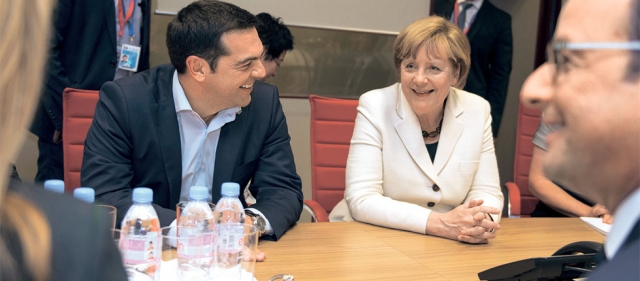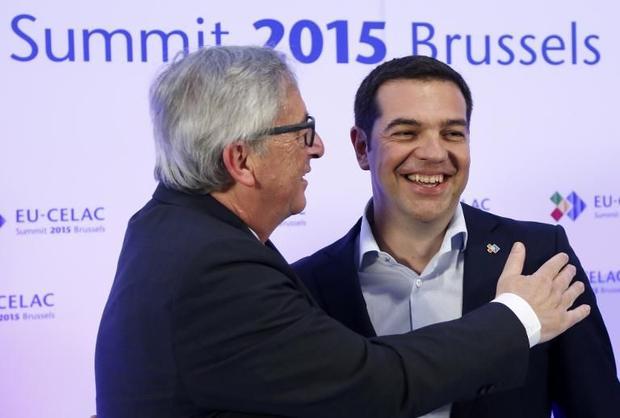Photo: Alain Jocard, AFP
The tense atmosphere in the negotiations between Greece and its creditors and the fears that Alexis Tsipras would not meet with Angela Merkel and Francois Hollande suddenly cleared up shortly before the extraordinary EU summit in Brussels yesterday.
The two European leaders met with the Greek Prime Minister at 11:00 pm. Two hours later the three came out of the room smiling and said they had agreed to further discuss the issues on which their views differed.
Only the Greek Prime Minister made an official statement after the meeting, at 02:00 am, and according to him, the agreement with the creditors "will allow Greece to return to economic growth with social cohesion and sustainable external debt."
Thus, Alexis Tsipras implied that the discussion had considered the debt issue, which is a prerequisite of absolute necessity for the government to be able to push the heavy budgetary measures in parliament and among the public.

According to the media, Merkel, Hollande and Tsipras discussed the Greek plan for a 9-month extension of the current bailout programme. In fact, it is an alternative to the German plan for its shorter extension (until autumn) that was presented by the German newspaper Die Welt last Thursday and that reflects the positions of Angela Merkel.
Yesterday afternoon, the economic agency Bloomberg reported that Germany would not object to a gradual extension of the current bailout "if Alexis Tsipras presents concrete political proposals for achieving the targets" and commits to implementing a major reform.
On Monday, the Wall Street Journal also informed of a scenario for a 9-month extension, citing European circles. A day earlier, the Greek newspaper Avgi that fully supports SYRIZA had presented the same scenario as "a Greek plan to help the country out of the impasse."
What Greece wants
Regardless of who is the author of the plan, he or she provides for the transfer of Greek government debt (bonds) worth 27 billion euro held by the European Central Bank to the European Financial Stability Facility. This will reduce its value and extend payments over time. In parallel, Greece will receive funding, namely the remaining 1.8 billion euro from the European participation in the bailout, the profits of the European Central Bank from the Greek government bonds and the 10.9 billion euro from the Financial Stability Fund, which were returned to the European Financial Stability Facility. In addition, the plan requires the institution to allocate another 1.2 billion euro and provides for the increase in the limit on the Greek government bonds issued by the European Central Bank.
The Greek proposal for an agreement includes as a prerequisite the settlement of government debt as well as a scheme of payments and instruments for debt reduction.
What Athens gives
‘In return’ for the plan that is supposed to be the subject of discussions, Greece proposes to take the following measures:
Firstly, to implement more painful structural reforms excluding the reddest of its red lines which are the allowance for those who receive very low pensions, taxation of electricity with the highest VAT rate, pension cuts and the reforms in labour legislation. According to sources from the European Commission, the allowance for low pensions and VAT on electricity are not among the measures that the creditors require to be included in the agreement.
As for the changes in labour legislation that the Greek cabinet wants to introduce, the bill is, and will continue to be, in the drawer of Minister Panos Skourletis. According to him, the document will come out of it only at the order of Alexis Tsipras.
It is highly certain that the measures will be implemented gradually, the goal being to connect the voting and implementation of the most painful of them with the allocation of the sums for the payment of the large loans to creditors by the end of August. In September, the pressure will not be so significant and none of the creditors can exclude the probability of the Greek government ceasing to comply strictly with the programme.
Secondly, to increase the budget surplus in 2015 from 0.75% to 1% of GDP. This means that the Greek cabinet must take additional measures for budget cuts amounting to around 500 million euro.
Currently there is no information on how close or different the positions of the two sides are with regard to the issue in question. According to the European sources, the Greek government has agreed on a budget surplus of 1% but State Minister Nikos Pappas who has been in Brussels since Monday together with Deputy Minister Euclidis Tsakalotos who is in charge of the negotiations on the Greek side has refuted the information. Other sources from the Greek cabinet argue that "the positions on the budget surpluses still differ and the Greek side is awaiting the comments of the institutions on its proposals."
The talks over the past few days and the coincidence of the date of presenting the plan for a 9-month extension of the programme seem to have surprisingly refreshed the tense atmosphere in Brussels.

Photo: Francois Lenoir, Pool/AFP
Jean-Claude Juncker who was previously defined as "angry" hugged Alexis Tsipras and there are even rumours about a meeting between them today. European Commissioner for Financial and Monetary Affairs Pierre Moscovici late in the afternoon expressed confidence that the creditors were closer than ever to an agreement with Greece. A day earlier, he had rejected the additional proposal of Athens.